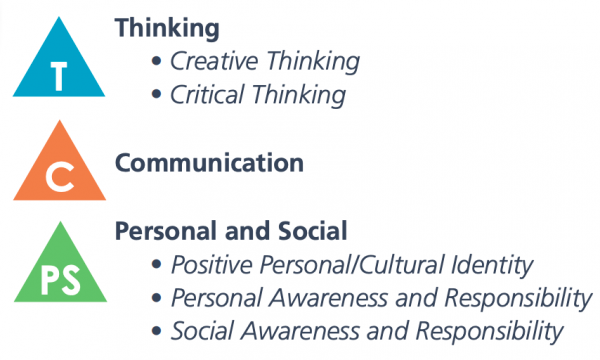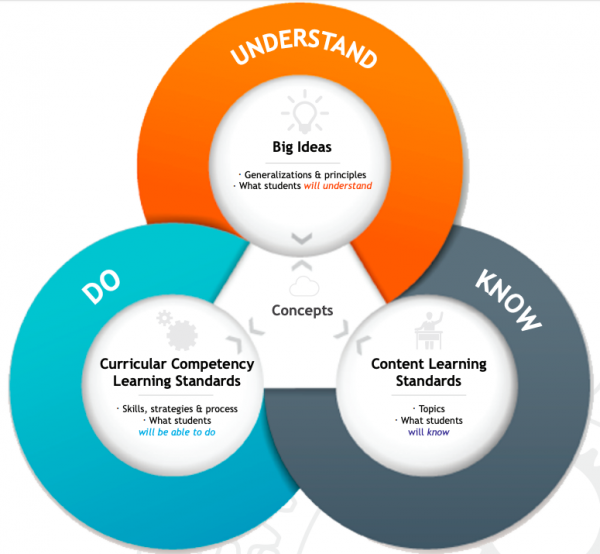Confluence and Influence
From Dave Truss, Inquiry Hub’s principal…
Background:
The 2018-2019 school year is Inquiry Hub Secondary’s 7th year since it was founded. Conceived of by Stephen Whiffin, now Director of Instruction with Coquitlam School District, I started as Vice Principal of the school with a teaching load to cover teacher preps for inaugural teachers Alan Soiseth and Dr. John Sarte. As a team we started a learning journey that continues today. The school has developed considerably since its inception and our current teaching staff, as well as our student body, continue to guide the school through improvements in course development and the implementation and delivery of our program.
Before we even got started, a team of us designed two Board Authority Authorized (BAA) courses for the school: Foundations of Inquiry and Digital Learning (digital literacy). Here are the original courses and the updates to meet the new BC curriculum requirements:
Original Courses
Foundations of Inquiry 11 – BAA Course (2012)
Applications of Digital Learning 10 – BAA Course (2012)
2018 Updated Courses
Foundations of Inquiry 10 – BAA Course 2018
Foundations of Inquiry 11 – BAA Course 2018
Applications of Digital Learning 10 – BAA Course 2018
These courses have been shared significantly with other BC, Alberta, and Ontario schools and school districts, and they have also been shared globally. The significance of these courses is that they create the venue through which our students can study passion projects of their choice and get credit for them, while training themselves to be ready to take Independent Directed Studies (IDS) courses. IDSes require students to design their own course with about 100 hours worth of time dedicated to their learning. Foundations of Inquiry gives students opportunities to explore different forms of inquiry and to dive deep into passion projects, while Digital Learning provides them with skills around areas such as research and presentation. To see some of the projects our students have worked on, visit InquiryHub.org/Students.
Here are a few more resources to help understand that journey the school has been on, already shared on my blog:
- Creating the time and space for self-directed, personalized, inquiry learning.
- The Inquiry Hub – Bright Ideas Gallery
- The 2015 CEA Ken Spencer Award goes to Inquiry Hub
- Learning and Failure
- Relevance Amplifies Learning
- Transforming Our Classrooms – Ignite Presentation
- Excellence is a Habit
- With great responsibility comes great power.” (Podcast with Dr. John Sarte)
- How Far Would You Go? and Created Entirely By Students
Confluence:
One of our early challenges with Inquiry Hub was that while we were creating a program that focused on student competencies, most BC curriculum courses were filled with content that, for lack of a better phrase, ‘got in the way’ of what we were trying to do. Foundations of Inquiry and Digital Learning were intentionally designed around developing learning skills or competencies rather than content, but the rest of the curriculum didn’t make this a focus. Fortunately, shortly after we created Inquiry Hub, the Provincial Government started to redesign the curriculum.
Where this was most helpful was:
1. A focus on Core Competencies
“Core Competencies are at the centre of the curriculum redesign in BC. Core Competencies are sets of intellectual, personal, and social and emotional proficiencies that all students need to develop in order to engage in deeper learning. The Core Competencies include thinking, communication, and social and personal competencies.”

“Competencies are embedded and evident within the learning standards. They come into play when students are engaged in “doing” in any area of learning. Together, the literacy and numeracy foundations, essential learning, and Core Competencies contribute to the development of educated citizens.”
2. A new Curriculum Model
“The curriculum model is made up of three elements: Content, Curricular Competencies, and Big Ideas. Teachers combine the three elements in ways they see fit to personalize learning in their classrooms. Content What students are expected to know Curricular Competencies What students are expected to do Big Ideas What students are expected to understand.”

“The model pulls together the best from modern learning theories and BC teachers’ advice. At the outset, BC educators said, curriculum needs to:
- be flexible to better enable teachers to innovate
- focus on higher-order learning
- address Core Competencies
- integrate Aboriginal world views and knowledge
- respect the unique nature of disciplines while supporting cross-curricular learning”
Inquiry Hub Secondary was already on a path of personalizing learning, with a focus on learning competencies. The school already had a focus on ‘Big Ideas’ that were cross-disciplinary, blending what students would Know, Do, and Understand. The courses we developed helped us on this journey, and so too was our desire to work closely with students and have them take responsibility for their own learning and the direction of the school. It was serendipitous that there was a confluence between what we were trying to achieve as an innovative school, and what the new BC Curriculum was also trying to achieve.
Influence:
Over the past six-and-a-half years, we have had countless educators visit us: from Alberta, Manitoba, Ontario, and the Yukon; from the US, China, England, Ireland, and Australia. Locally, we’ve had educators from across BC and the Lower Mainland visit us as well, both from the public and private sectors. These tours rely on student tour guides and student presentations as well as time spent with our teachers. Blog posts have been written about the visits, and we often share resources including the BAA courses we developed. It is not always easy to measure influence, but here are a few examples of how Inquiry Hub Secondary has influenced schools and programs in Coquitlam and beyond:
Digital Learning 10 in Coquitlam
This year over 2,000 grade 9 students took Digital Learning 10 in Coquitlam.
Where we have seen the biggest influence has been in our own school district. In 2015 Riverside Secondary School started delivering Digital Learning 10 to their Grade 9 students (which is also the grade we deliver it at for Inquiry Hub students). As described by the Riverside Principal:
Our main goal was to create a clear and coherent framework that would enable our students to develop the digital literacy skills necessary in today’s world. I think the decision to bring this in was multifaceted.
1. We felt that students were learning about the outcomes in DL10, but we needed a better model for assessment.
2. We felt that the course offered a coherent framework that enabled us communicate with staff, parents, and students what we were prioritizing with respect to digital literacy.
3. It offered us the staffing to coteach, coplan with the classroom teachers so that we could build more capacity with staff, but also ensure that every child was getting explicit instruction in the areas of the 5 fluencies and digital citizenship. In particular though, it was a way to ensure that all students were documenting their learning through their Edublog.
Benefits:
Staff became more proficient at integrating technology for learning.
Students developed strong skills in the areas of communication/media, research, creativity, problem solving, and collaboration. We spent a great deal of time working with them on the ethics/responsibility of interacting virtually. I think one of the greatest benefits was that students created their own digital profile that allowed them to showcase their learning, strengths, and passions. This positive digital footprint was something they could use to seek employment, apply for scholarships, use in their GT interviews, and help their parents see what they were learning at school. Several students have gone on to pursue fields related to technology (Tesla, Bio Technology, Computer Engineering, etc).
~ Anthony Ciolfitto
In September 2017, two more schools, Heritage Woods and Port Moody, also added the course, and this past September (2018), seven of our eight high schools offered the course with the last school, Centennial, being added next September. This year over 2,000 students took the course, originally designed for Inquiry Hub! Next year it will be delivered to almost every Grade 9 student in the district.
Digital Learning 10 in Abbotsford
In 2014, the Abbotsford school district were re-imagining what the Rick Hansen High School could be, and a team of educators and educational leaders from the district visited Inquiry Hub. The influence of that trip can be seen in this article, shared on their school blog on November 30, 2015. They were influenced both by the Digital Learning course, and by our use of inquiry-based learning.
2016 was the first year that they used the Digital Learning Course as part of their Grade 9 interdisciplinary pod. They called it Digital Literacy and integrated it into their program, like we do at Inquiry Hub. As shared here on March 26, 2015:
“Next year [2016] at Rick Hansen our students will be working in an inquiry based environment… Students will be expected to pursue knowledge to prove their understanding as they solve real world problems that ignites a passion in them. Our grade nines will be in a cutting edge interdisciplinary model where math, English, science and digital literacy are taught in unison, not isolation.”
Rocky View School District, Alberta
“Inquiry Hub has been a frequent site visit for divisional leaders, administrators and teachers from Rocky View Schools. The ripple effect of these visits can be seen in our commitment to making learning visible, both within our division and beyond, through social media and celebrations of students who share their learning. A common reflection we’ve had, and incorporated into our instructional leadership and design conversations, is how might we create the conditions for student engagement and ownership of their learning? The Inquiry Hub is a space where confident, engaged students can tell you what they are learning, why it is important, and who needs to hear about it. We will continue to follow and visit Inquiry Hub to inspire educators in our division to strive for student agency and student voice as they design learning in Rocky View.”
~ Dan McWilliam – Learning Design Team. Rocky View Schools, Alberta.
Burnaby School District
I have had the opportunity to visit The Inquiry Hub with teams of teachers from our school on a couple of occasions. These visits helped push our thinking in the areas of student voice, flexible environments, community connections and authentic learning opportunities. We were particularly impressed with how the staff support students in pursuing their passions! Further, connecting with the students and staff at The Inquiry Hub provided us valuable insight into the necessary supports, structures and considerations as we move toward innovative learning environments at our school.
~Dave Rawnsley – Principal – Burnaby North Secondary School
Other places Inquiry Hub has been influential:
- EdTech Magazine, Focus on K-12 Article: How Do You Teach Digital Literacy?
—–
—–
- Letter of Support ~ Gordon Li ~ Director of Learning Technologies and District Outreach, BC Ministry of Education.
—–
- A research project based on the Inquiry Hub program for Grade 3 students in Wisconsin:
Changing the Culture of Learning
It’s about the Kids – Our Journey to Personalize Learning byPamela Sengos
—–
- 2017 Shortlist and Nominees – Finalists – Dream_Create_Learn:
Inquiry Hub and Student-Powered Projects
—–
All that said, if you want to know where our greatest influence happens, have a look at the kinds of things students do at the school and create for the school.